Many of the diagrams given in Fig 5.7 show magnetic field lines (thick lines in the figure) wrongly. Point out what is wrong with them. Some of them may describe electrostatic field lines correctly. Point out which ones. 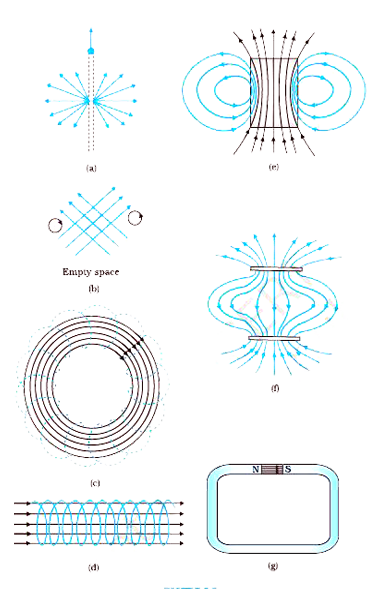 Solution in Gujrati
Solution in Gujrati
(a) Wrong. Magnetic field lines can never emanate from a point, as shown in figure. Over any closed surface, the net flux af B must always be zero, i.e., pictorially as many field lines should seem to enter the surface as the number of lines leaving it. The field lines shown, in fact, represent electric field of a long positively charged wire. The correct magnetic field lines are circling the straight conductor, as described in Chapter 4.
(b) Wrong. Magnetic field lines (like electric field lines) can never cross each other, because otherwise the direction of field at the point of intersection is ambiguous. There is further error in the figure. Magnetostatic field lines can never form closed loops around empty space. closed loop of static magnetic field line must enclose a region across which a current is passing. By contrast, electrostatic feld lines can never form closed loops. neither in empty space. nor when the loop encloses charges.
(c) Right. Magnetic lines are completely confined within a toroid. Nothing wrong here in field lines forming closed loops, since each loop encloses a region across which a current passes. Note, for clarity of figure, only a few field lines within the toroid have been shown. Actually, the entire region enclosed by the windings contains magnetic field.
(d) Wrong. Field lines due to a solenoid at its ends and outside cannot be so completely straight and confined, such a thing violates Ampere.s law. The liries sipould curve out at both ends, and meet eventually to form closed loops.
(e) Right. These are held lines outside and inside a bar magnet. Note carefully the direction of field lines inside. Not all field lines emanate Ampere.s law. The lines should curve out at both ends, and meet eventually to form closed loops,
(e) Right. These are field lines outside and inside a bar magnet, Note carefully the direction of field lines inside. Not all field lines eranate out of a north pole (or converge into a south pole). Around both the N-pole, and the S-pole, the net flux of the field is zero.
(f) Wrong. These field lines cannot possibly represent a magnetic field. Look at the upper region. All the field lines seem to emanate out of the shaded plate. The net flux through a surface surrounding the shaded plate is not zero. This is impossible for a magnetic field. The given field lines, in fact, show the electrostatic field lines around a positively charged upper plate and a negattvely charged lower plate. The difference between Fig. 15.7(e) and (f)] should be carefully grasped.
(g) Wrong. Magnetic field lines between two pole pieces cannot be precisely straight at the ends. Some fringing of lines is inevitable. Otherwise, Ampere.s law is violated. This is also true for electric field lines.
Topper's Solved these Questions
- MAGNETISM AND MATTERBOOK - NCERT GUJARATICHAPTER - MAGNETISM AND MATTEREXERCISE - Exercises
25 Videos
- MAGNETISM AND MATTERBOOK - NCERT GUJARATICHAPTER - MAGNETISM AND MATTEREXERCISE - Additional Exercises
19 Videos
- ELECTROSTATIC POTENTIAL AND CAPACITANCE BOOK - NCERT GUJARATICHAPTER - ELECTROSTATIC POTENTIAL AND CAPACITANCE EXERCISE - EXERCISES
35 Videos
- MOVING CHARGES AND MAGNETISM BOOK - NCERT GUJARATICHAPTER - MOVING CHARGES AND MAGNETISM EXERCISE - ADDITIONAL EXERCISES
17 Videos
Similar Questions
Answer the question regarding earth's magnetism:
A vector needs three quantities for its specification. Name the three independent quantities conventionally used to specify the earth's magnetic field.
View SolutionWhy does a paramagnetic sample display greater magnetisation (for the same magnetising field) when cooled?
View SolutionTwo charges 5×10−8 C and −3×10−8 C are located 16 cm apart. At what point(s) on the line joining the two charges is the electric potential zero? Take the potential at infinity to be zero.
View SolutionTwo concentric circular coils X and Y of radii 16 cm and 10 cm, respectively, lie in the same vertical plane containing the north to south direction. Coil X has 20 turns and carries a current of 16 A, coil Y has 25 turns and carries a current of 18 A. The sense of the current in X is anticlockwise, and clockwise in Y, for an observer looking at the coils facing west. Give the magnitude and direction of the net magnetic field due to the coils at their centre.
View SolutionMany of the figure. show magnetic field lines wrongly (thick lines in the figs). Point out what is wrong with them. Some of them may describe electrostatic field lines correctly. Point out which ones. Remember we are talking of only static electric or magnetic field.
View Solutionनिचे दिए गए चित्रों में से कई में चुंबकीय क्षेत्र रेखाएं गलत दर्शायी गयी है! [चित्रों में मोती रेखाएं]! पहचानिये की उनमे गलती क्या है! इनमे से कुछ में वैधुत क्षेत्र रेखाये ठीक-ठीक दर्शाई गई है! बताइये , वे कौन से चित्र है?
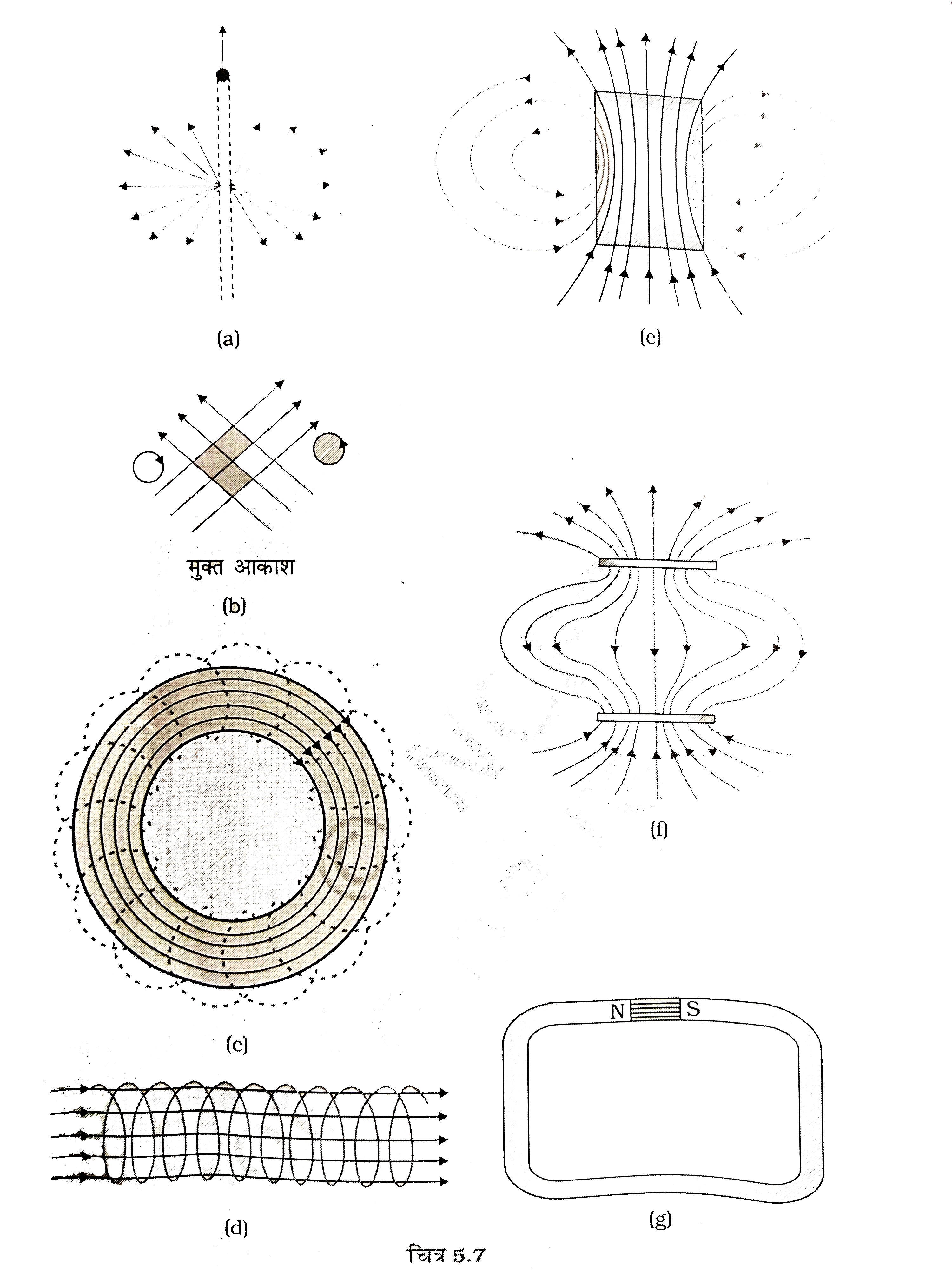
View SolutionMany of the diagrams given in Fig. show magnetic field lines (thick lines in the figure) wrongly. Point out what is wrong with them. Some of them may describe electrostatic field lines correctly. Point out which ones.
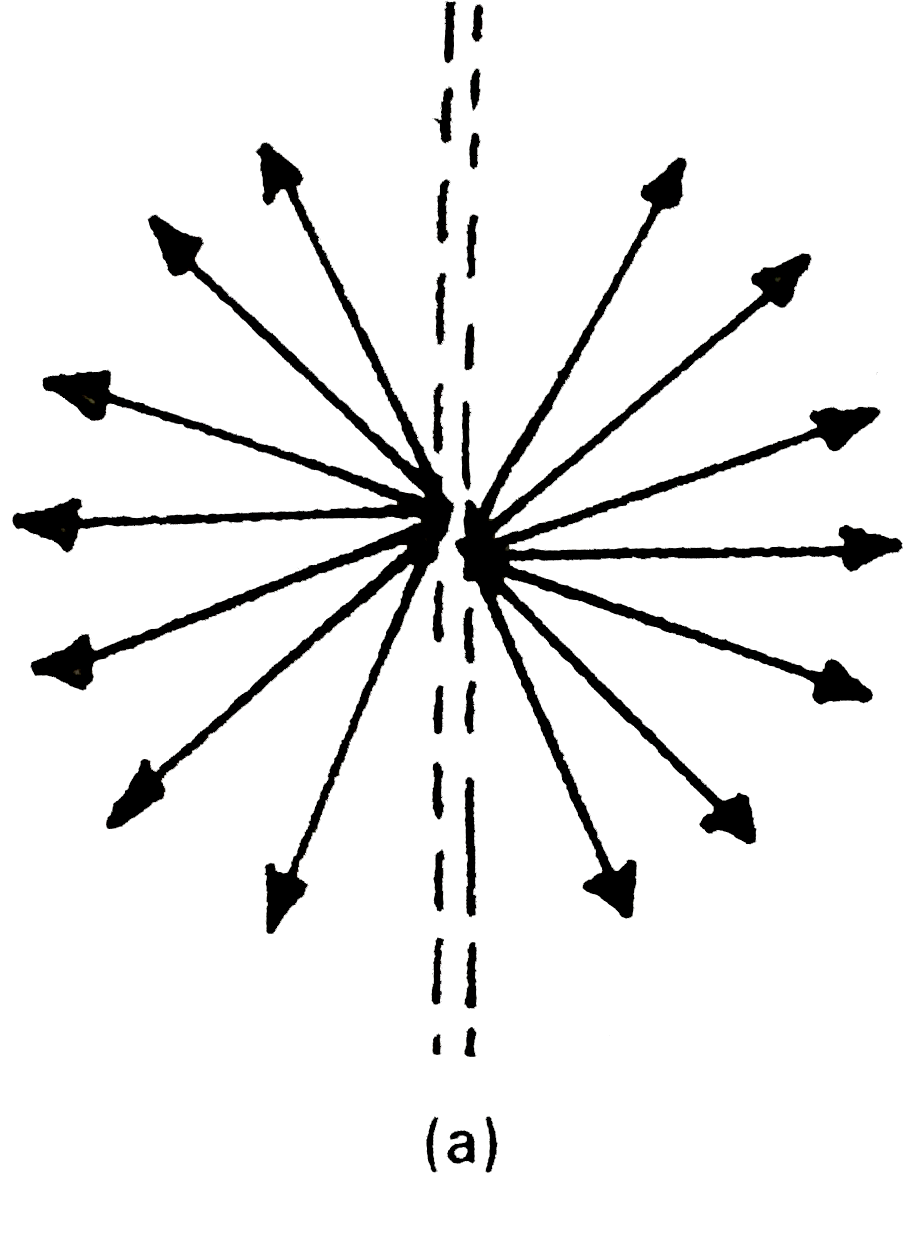
View SolutionMany of the diagrams given in Fig. show magnetic field lines (thick lines in the figure) wrongly. Point out what is wrong with them. Some of them may describe electrostatic field lines correctly. Point out which ones.
View SolutionMany of the diagrams given in Fig. show magnetic field lines (thick lines in the figure) wrongly. Point out what is wrong with them. Some of them may describe electrostatic field lines correctly. Point out which ones.
View SolutionMany of the diagrams given in Fig. show magnetic field lines (thick lines in the figure) wrongly. Point out what is wrong with them. Some of them may describe electrostatic field lines correctly. Point out which ones.
View SolutionMany of the diagrams given in Fig. show magnetic field lines (thick lines in the figure) wrongly. Point out what is wrong with them. Some of them may describe electrostatic field lines correctly. Point out which ones.
View SolutionMany of the diagrams given in Fig. show magnetic field lines (thick lines in the figure) wrongly. Point out what is wrong with them. Some of them may describe electrostatic field lines correctly. Point out which ones.
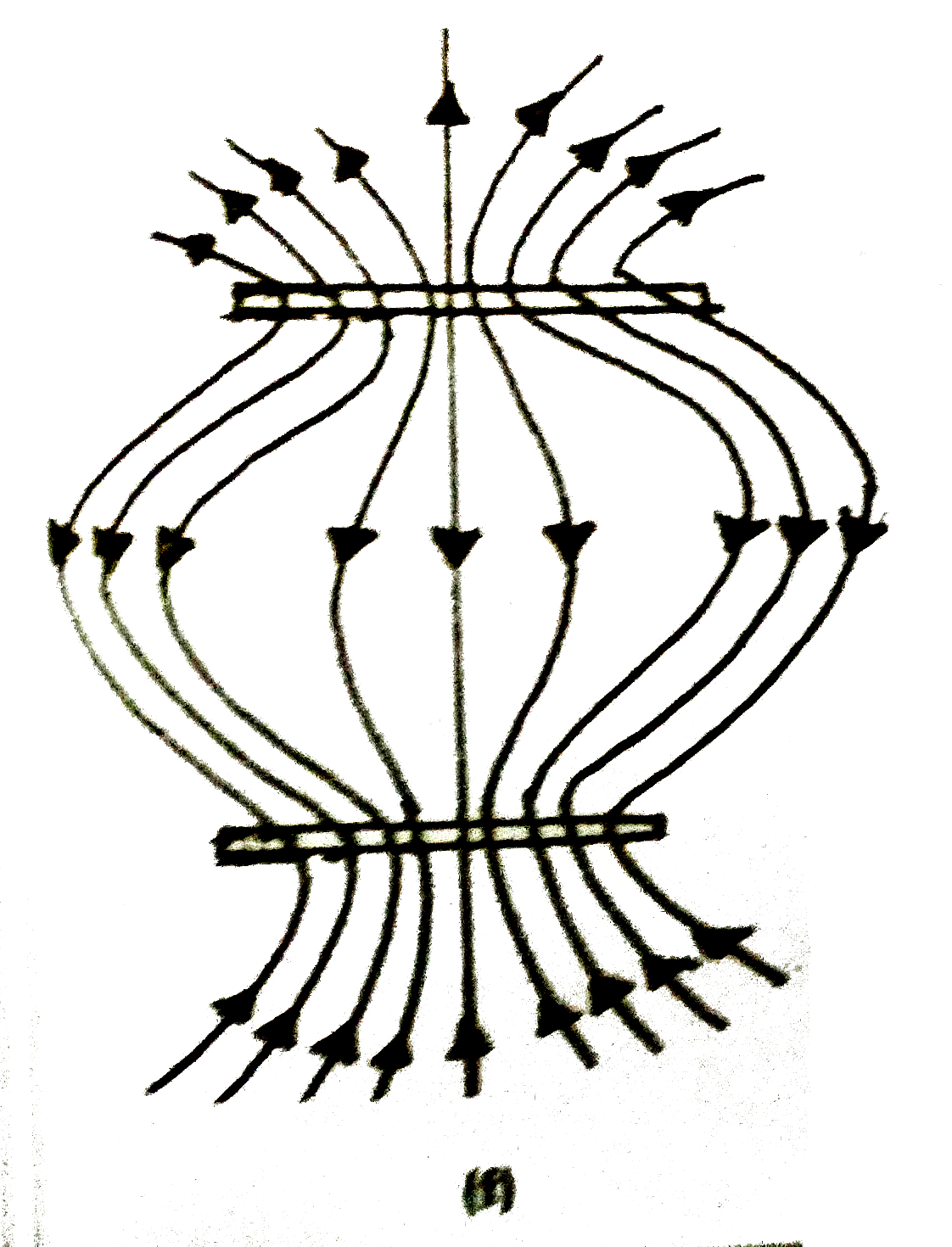
View SolutionMany of the diagrams given in Fig. show magnetic field lines (thick lines in the figure) wrongly. Point out what is wrong with them. Some of them may describe electrostatic field lines correctly. Point out which ones.
View Solutionनिम्न में से चुम्बकीय क्षेत्र रेखाओं के सही आरेख की पहचान कीजिए। उनमें से कुछ गलत क्यों है?
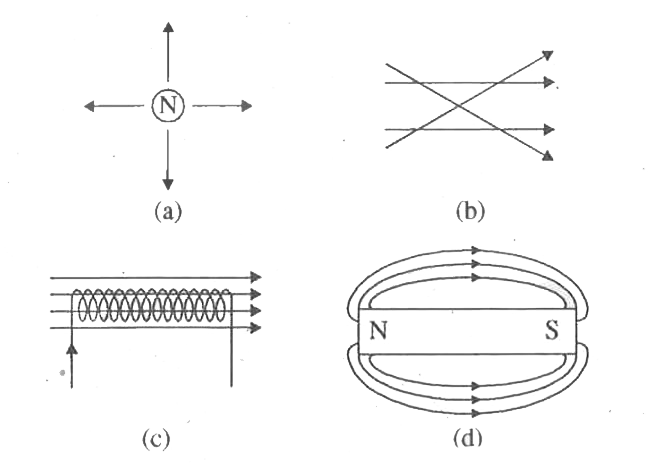
View Solutionनीचे दिए गए चित्रों में कई में चुंबकीय क्षेत्र रेखाएँ गलत दर्शाई गई हैं। पहचानिए कि उनमें गलती क्या । है ? इनमें से कुछ में वैद्युत क्षेत्र रेखाएँ ठीक-ठीक दर्शाई गई हैं।बताइए वे कौन-से चित्र हैं?
Q(a)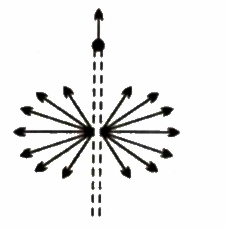
View Solutionनीचे दिए गए चित्रों में कई में चुंबकीय क्षेत्र रेखाएँ गलत दर्शाई गई हैं। पहचानिए कि उनमें गलती क्या । है ? इनमें से कुछ में वैद्युत क्षेत्र रेखाएँ ठीक-ठीक दर्शाई गई हैं।बताइए वे कौन-से चित्र हैं?
Q(b)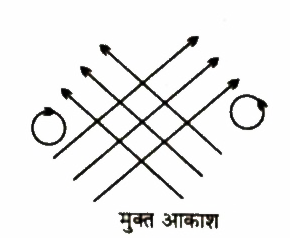
View Solution
